February 1, 2012
Edited by David Sanders
Specimen Days
February 1, 2012
1502 – Olivier de la Marche, Flemish writer/poet/governor, dies.
1796 – Abraham Emanuel Fröhlich, Swiss poet (d. 1865), is born.
1872 – Paul Fort, French poet/founder of Vers et Prose, is born.
1874 – Hugo von Hofmannsthal, Austria, poet/dramatist/essayist, is born.
1902 – Langston Hughes, poet/translator (Weary Blues), is born.
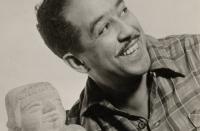 Snake
Snake
He glides so swiftly
Back into the grass—
Gives me the courtesy of road
To let me pass,
That I am half ashamed
To seek a stone
To kill him.
Langston Hughes (1902–1967)
Poetry In The News
Louder than a Bomb, Chicago’s Youth Poetry Slam, Takes an Overseas Tour
 The new documentary Louder than a Bomb depicts the world’s largest youth poetry slam, which takes place here in Chicago. Every year, students from local high schools gather to tell their stories in the form of highly emotional, expressive spoken word poetry. And every year, the crowd goes wild. Read more at WBEZ.
The new documentary Louder than a Bomb depicts the world’s largest youth poetry slam, which takes place here in Chicago. Every year, students from local high schools gather to tell their stories in the form of highly emotional, expressive spoken word poetry. And every year, the crowd goes wild. Read more at WBEZ.
World Poetry
Poetry Fights Back
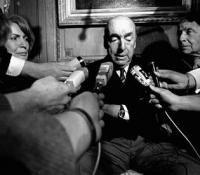 Pablo Neruda, Chile’s Nobel Prize-winning poet, would have been a powerful voice in exile against the dictatorship of Gen. Augusto Pinochet. But that all changed just 24 hours before Neruda was to flee the country in the chaos following the 1973 military coup. He was 69 years old and suffering from prostate cancer when he died, exactly 12 days after the brutal coup that ended the life of his close friend, socialist President Salvador Allende. The official version was that he died of natural causes brought on by the trauma of witnessing the coup and the lethal persecution of many of his friends. But doubts remained, even after Pinochet relinquished power in 1990 and Chile became one of Latin America’s most stable democracies. Read more at the Boston Herald.
Pablo Neruda, Chile’s Nobel Prize-winning poet, would have been a powerful voice in exile against the dictatorship of Gen. Augusto Pinochet. But that all changed just 24 hours before Neruda was to flee the country in the chaos following the 1973 military coup. He was 69 years old and suffering from prostate cancer when he died, exactly 12 days after the brutal coup that ended the life of his close friend, socialist President Salvador Allende. The official version was that he died of natural causes brought on by the trauma of witnessing the coup and the lethal persecution of many of his friends. But doubts remained, even after Pinochet relinquished power in 1990 and Chile became one of Latin America’s most stable democracies. Read more at the Boston Herald.
Dissident Charged with Subverting China’s State Power by Writing Poem
One of China’s best-known dissenting voices has been charged with subverting state power after he wrote a poem whose content was deemed dangerous. Internet writer Zhu Yufu (60) comes from the eastern city of Hangzhou and was the founder and editor of the China Democracy Party’s magazine. He was arrested last April but only charged now. No date has been set for his trial. Read more at The Irish Times.
New Books
The Collected Poems of Eugenio Montale: 1925-1977 edited by Rosanna Warren, translated by William Arrowsmith
[Hardcover] W. W. Norton & Company, 832 pp., $49.95
Hailed as one of the key poets of the modern era, Eugenio Montale changed Italian poetry forever and helped to create international Modernism. Steeped in the tradition of Dante, Petrarch, and Leopardi, yet fiercely innovative, in each new book Montale challenged the styles he had previously established. His poems chart an adventure of consciousness and conscience in response to the shocks of modernity, fascism, and two world wars, and they also present several of the greatest erotic sequences in modern poetry. The Collected Poems of Eugenio Montale publishes for the first time in English William Arrowsmith’s pellucid translations of Poetic Diary 1971, 1972, and the Poetic Notebook, as well as his previously published translations of four volumes: Cuttlefish Bones, The Occasions, The Storm and Other Things, and Satura. With the wide range of Montale’s poetry at last available to the English reader, this collection reveals Montale to be the greatest Italian poet of the twentieth century.
Deep Field by Philip Gross
[Paperback] Bloodaxe Books, 64 pp., $21.95
In his nineties Philip Gross’s father, a wartime refugee, began to lose his several languages, first to deafness, then profound aphasia. Deeply thought as well as deeply felt, these poems reach into that gulf to find him – through recovery of histories both spoken and unspoken as well as an excavation of the spoken word itself. Readers who admired Philip Gross’s subtlety and range in his T.S. Eliot Prize-winning collection The Water Table will find those qualities brought to a new human urgency in the compelling sequences of Deep Field.
A Map of the Lost World by Rick Hilles
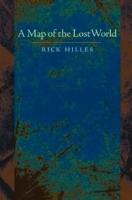 [Paperback] University of Pittsburgh Press, 96 pp., $15.95
[Paperback] University of Pittsburgh Press, 96 pp., $15.95
“Always a poet of authentic promise, with A Map of the Lost World, Rick Hilles emerges into an importance that may rival such poets as Henri Cole and Rosanna Warren. I find it immensely moving that he evokes dead poets for whom I cared personally as well as critically, including James Wright and James Merrill. Beyond that he adds what may be a new dimension to our poetry by evoking the shade of Walter Benjamin and with it the tragedy of European Jewry. I emerge from this book somber yet fortified because like Kafka it reminds us of a kind of indestructibility of the human spirit.” –Harold Bloom
Chinoiserie by Karen Rigby
[Paperback] Ahsahta Press, 72 pp., $17.50
Winner of the 2011 Sawtooth Poetry Prize, selected by Paul Hoover, Chinoiserie travels through centuries in poems that carve wonder from ruin, from an illuminated manuscript to New York on the eve of disaster, the Emperor’s nightingale to neon aquariums. A sensory flight, intricate in its vision, Ecclesiastic in its hunger, and brutal in its portrayal of a solitude that “could surrender / to the hammer or the flame,” this book of curiosities draws inspiration from 15th century masters, Japanese animation, mid-century films, Marguerite Duras, and other sources. Inspired by an art created miles from its origins to become its own translation of landscape, texture, and pattern, Chinoiserie disrupts boundaries between tribute and theft, reinvention and repetition. It evokes the fanciful as well as a darker potentiality, seeking a language “of pearl and roaring.”
Exit Island by Terri Witek
 [Paperback] Orchises Press, 112 pp., $18.95
[Paperback] Orchises Press, 112 pp., $18.95
“Terri Witek’s Exit Island is a book of voyages, both terrestrial and temporal—explorations mythical and poetic. The reigning deities are Ariadne and Fernando Pessoa, and in verse lyrical and experimental Witek creates a world filled with snake handlers, sea nymphs, sea chants, and mutinies. Hold on, dear reader. This is a book like no other, a swirling microcosm of the tragic and playful, of betrayal and deep and abiding love.” —Barbara Hamby
Recent Reviews
Selected Poems by Christopher Reid – Review
With his first collection, Arcadia, in 1979, Christopher Reid elaborated a fresh vision for English poetry. The title poem evokes a “crayoned dream-town”, a “studious invention” of a place where “the chimneys think smoke” and the inhabitants “contrive to greet us / with smiles like black bananas”. The oblique angles of observation and disorienting imagery are executed with a skill and sureness of tone that immediately inspire confidence in the reader: this is a poet who knows exactly what he’s doing and where he wants to take you. The book’s keynotes are its brilliant visual similes, which cause the poems to lurch off in unexpected directions: pigs’ heads on a butcher’s slab are “pallid putti” with “ears like wings”; a weightlifter looks like a “human telephone”; beach-side palm trees are “nature’s swizzle-sticks” that “stir the afternoon air / to a sky-blue cocktail / of ozone and dead fish”. Read more at the Guardian.
A Neglected Master in Our Midst
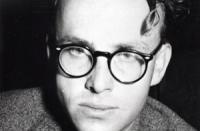 Bill Coyle on Daryl Hine
Bill Coyle on Daryl Hine
When Daryl Hine’s Recollected Poems was published in 2009 it marked something of a comeback for a poet who in the mid 1990s had turned his back on the publishing industry and begun posting his new poems on a website, through which he also accepted donations. It was hard, at least for those of us who have grown up in a book culture, not to see this as a comedown. A poet’s poet, and an unfashionable on at that, Hine had never been exactly famous, even by poetry standards. Still, he had published for decades with venerable houses like Athenaeum and Knopf, established himself as a leading translator of the classics, spent ten years as editor of Poetry, and, in 1986, been given a MacArthur “genius” grant. Those apologetic quotation marks, by the way, are unwarranted in this case. Daryl Hine is, I believe, a genius. Read more at Contemporary Poetry Review.
Thinking and Thanking
Peter Campion on Carol Muske-Dukes and Ange Mlinko on Susan Stewart
You wake up in a new city, but you don’t know which one it is. Before the rational part of your mind kicks in, while the traffic blurs past, your memory shuffles for possible answers. New York? Your cousin’s house in Jackson, Mississippi? Los Angeles? Or right at home, wherever that may be? The disorientation can be unnerving, but strangely pleasurable too. Certainly, there’s a tinge of glamour: if you don’t know what city you’re in, you must really be a big shot. But that doesn’t completely explain the pleasure; there’s something deeper, something more immediately grafted to sensation. You feel that you’re waking into the unknown, the possible. Your consciousness and your surroundings have become mutually permeable. Or else, the opposite feels true: the link between consciousness and its surroundings has broken, and now you must struggle to readjust. Either way, in those moments, the relation of the self to the world feels somehow more active, more engaged. Read more at the LA Review of Books.
Correspondences
From the Archive: “The Work!” – A Conversation with Elizabeth Bishop
by George Starbuck
Reprinted with newly restored content from Issue 11 of Ploughshares, Spring 1977 (guest-edited by Jane Shore and DeWitt Henry)
A gray late afternoon in winter. Elizabeth Bishop, dressed casually in a Harvard jersey, welcomes the interviewer and answers his polite questions about a gorgeous gilt mirror on her living room wall. Yes, it is Venetian, those little blackamoors are Venetian, but it was picked up at an auction in Rio de Janeiro. The interviewer, sure in advance this is nothing to have asked one of his favorite poets to do, squares away with his cassette recorder on the coffee table and pops a prepared question. A wonderful expanse of books fills the wall behind the sofa. Before long there is laughter. A good memory, the thought of a quirk or extravagance in someone she knows and likes, sets Miss Bishop off. The laughter is quick, sharp, deep. No way to transcribe it. Read more at Ploughshares.
Adonis: A Life in Writing
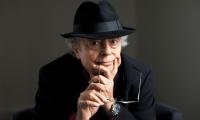 by Maya Jaggi
by Maya Jaggi
Adonis, the greatest living poet of the Arab world, ushers me down a labyrinthine corridor in a stately building in Paris, near the Champs Elysées. The plush offices belong to a benefactor, a Syrian-born businessman funding the poet’s latest venture – a cultural journal in Arabic, which he edits. Fetching a bulky manuscript of the imminent third issue of the Other, Adonis hefts it excitedly on to a coffee table, listing the contributors “from west and east”, many of them of his grandchildren’s generation. He turned 82 this month. His eyes spark: “We want new talents with new ideas.” Read more at the Guardian.
John Foy: The TNB Self-Interview
by John Foy
I was in an English class at a place called the Englewood School for Boys. We were reading Shakespeare’s Julius Caesar with our teacher, Malcolm Duffy, and I was struck down by what Brutus said to Cassius before they parted ways toward the end, on the plains of Philippi: “O that a man might know / the end of this day’s business ‘ere it come! / But it sufficeth that the day will end, / and then the end is known.” I’d look around at my friends and classmates in the hallways of that school and think to myself, “Well, you’re quite handsome, or you’re a fine athlete, or you come from a rich family, but I never heard YOU say anything like that. You probably never will. But I am going to try.” Read more at The Nervous Breakdown.
Broadsides
Confiance au Monde; or, The Poetry of Ease
by Oren Izenberg
This paper is an attempt to give content to some intuitions about what I will call “ease” in poetry. The state or condition of ease, I will define provisionally as a fit of person to world, a relation to experience that is uncrossed, unchecked, undarkened by some more familiar alternative states of mind or conditions of life: skepticism, anxiety, alienation, repression, bad faith. The poetry of ease (should such a thing exist) would be poetry that does not speak of that state as one speaks of an unknown country we might wish one day to visit—Cockaigne, Bensalem, Innisfree—but rather a poetry that expresses ease as we express our native air: stirring it with our living presence, not exhausting it with our efforts. In a more technical idiom, a poetry that expresses ease would be expressive in the same unpressured and oddly passive sense of the word “express” that we use when we say that our genetic material is expressed in our phenotype, or when we say that a natural language expresses the grammar that makes it possible. Read more at Nonsite.
Drafts & Fragments
Today’s Poetry: Finding its Way
Josif Brodski w Fotografiach
Envoi: Editor’s Notes
Poem Forest: An Audiovisual Tour
 by Jon Cotner
by Jon Cotner
Poem Forest took place November 2011 at the New York Botanical Garden, which was celebrating the renovation of its 50-acre old-growth forest. The Garden, in conjunction with the Poetry Society of America, asked me to do something poetry-related on site. This commission excited me because I wanted to pull poetry from libraries, magazines, books, etc., and put it in the world. I’ve always felt that poetry is not an art object to be idly studied. Rather, it’s a way of life, a mode of knowing—a call to become more attentive and active. Koreans have an important proverb: “Knows his way, stops seeing.”
If you have been following the newsletter over the past year or so, you know how enamored I am of poetry in public places. The Poem Forest is a prime example of the efforts I’ve documented from around the country that aim to unleash poetry from its confinement on the page and make it a part our daily experience. The more that poetry is embedded in unexpected venues, whether rattling around in a gumball machine, stitched into vintage clothing, or handed out to passersby on a random basis, the more it becomes part of the greater world. That’s a good thing. Keep it up out there. . . .
—David Sanders
